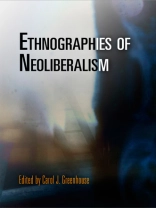Since 2008, the global economic crisis has exposed and deepened the tensions between austerity and social security—not just as competing paradigms of recovery but also as fundamentally different visions of governmental and personal responsibility. In this sense, the core premise of neoliberalism—the dominant approach to government around the world since the 1980s—may by now have reached a certain political limit. Based on the premise that markets are more efficient than government, neoliberal reforms were pushed by powerful national and transnational organizations as conditions of investment, lending, and trade, often in the name of freedom. In the same spirit, governments increasingly turned to the private sector for what were formerly state functions. While it has become a commonplace to observe that neoliberalism refashioned citizenship around consumption, the essays in this volume demonstrate the incompleteness of that image—as the social limits of neoliberalism are inherent in its very practice.
Ethnographies of Neoliberalism collects original ethnographic case studies of the effects of neoliberal reform on the conditions of social participation, such as new understandings of community, family, and gender roles, the commodification of learning, new forms of protest against corporate power, and the restructuring of local political institutions. Carol J. Greenhouse has brought together scholars in anthropology, communications, education, English, music, political science, religion, and sociology to focus on the emergent conditions of political agency under neoliberal regimes. This is the first volume to address the effects of neoliberal reform on people’s self-understandings as social and political actors. The essayists consider both the positive and negative unintended results of neoliberal reform, and the theoretical contradictions within neoliberalism, as illuminated by circumstances on the ground in Africa, Europe, South America, Japan, Russia, and the United States. With an emphasis on the value of ethnographic methods for understanding neoliberalism’s effects around the world in our own times, Ethnographies of Neoliberalism uncovers how people realize for themselves the limits of the market and act accordingly from their own understandings of partnership and solidarity.
Table des matières
Introduction
—Carol J. Greenhouse
PART I. STATE INVESTMENTS IN INSECURITY
1 Security and the Neoliberal State: British Political Imaginaries After 7/7
—Kathleen Hall
2 The War on Terror and the Paradox of Sovereignty: Declining States and States of Exception
—Joseba Zulaika
3 Liberalism Against Neoliberalism: Resistance to Structural Adjustment and the Fragmentation of the State in Russia and Hungary
—Kim Lane Scheppele
4 Japan as Mirror: Neoliberalism’s Promise and Costs
—Amy Borovoy
PART II. POLITICS IN THE PUBLIC-PRIVATE DIVIDE
5 Local Political Geography and American Political Identity
—Robert R. Rodgers, Stephen Macedo
6 Urbanizing the San Juan Fiesta; Civil Society and Cultural Identity in the Barrios of Caracas
—Sujatha Fernandes
7 Neoliberalism, Satirical Protest, and the 2004 U.S. Presidential Campaign
—Angelique Haugerud
PART III. MARKETS FOR CULTURAL DIVERSITY
8 The Question of Freedom: Post-Emancipation South Africa in a Neoliberal Age
—Anne-Maria Makhulu
9 Neoliberal Cultural Heritage and Bolivia’s New Indigenous Public
—Robert Albro
10 Neoliberal Education: Preparing the Student for the New Workplace
—Bonnie Urciuoli
11 Harlem’s Pasts in Its Present
—Sandhya Shukla
PART IV. AGENCY AND AMBIVALENCE
12 Performing Laïcité: Gender, Agency, and Neoliberalism Among Algerians in France
—Jane E. Goodman
13 The ‘Daughters of Soul’ Tour and the Politics and Possibilities of Black Music
—Maureen Mahon
14 Rags to Riches: Religion, Media, and the Performance of Wealth in a Neoliberal Age
—Maria Frederick
15 The Temporality of No Hope
—Hirokazu Miyazaki
Notes
References
List of Contributors
Index
Acknowledgments
A propos de l’auteur
Carol J. Greenhouse is Department Chair and Arthur W. Marks ’19 Professor of Anthropology at Princeton University. She is the author of The Paradox of Relevance: Ethnography and Citizenship in the United States, also available from the University of Pennsylvania Press, as well as coeditor of Ethnography in Unstable Places: Everyday Life in the Context of Dramatic Political Change and editor of Democracy and Ethnography: Constructing Identities in Multicultural Liberal States.












